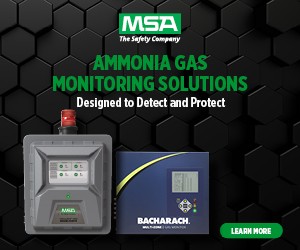IIAR Brings Synchronous Learning Opportunities to Industrial Refrigeration
In March, IIAR partnered with Don Fenton, a professor of mechanical and nuclear engineering at Kansas State University, to bring the 54th offering of the Industrial Refrigeration Workshop to participants through online synchronous learning, which allowed participants to interact with instructors in real-time.
“This was a unique opportunity brought on by the COVID-19 pandemic. Any other year, this would have been held in person,” said Eileen McKeown, vice president for marketing and sales for IIAR. “We were happy to help him facilitate the 54th program so that he did not lose continuity or momentum.”
IIAR used its Learning Management System to deliver content daily to attendees and to track participation. “We also used our online meeting platform to engage with attendees directly,” McKeown said.
Fenton has traditionally held a week-long in-person training at various venues, including Kansas State University. While the format changed, the training did not. “The workshop had the same goals as in the past: to deliver the technical content, the same technical content and we covered exactly what we wanted to,” Fenton said.
Rather than do the workshop in one whole week, IIAR and Fenton divided it out over two weeks, requiring a half-day from attendees. “That way we could not take a person’s entire day to attend the workshop, and our attendees could continue working at their place of employment,” Fenton said.
The class is technical in nature and covered the design of ammonia refrigeration systems and facilities. “From the importance of how building materials affect refrigerant load to designing a closed loop ammonia refrigeration system, this course covered it all,” McKeown said.
The course is hands-on with participants designing a refrigeration system for a fictional facility and calculating all of the refrigeration needs. “We’re trying to engage them and get them thinking about the actual refrigeration requirements,” Fenton said.
Fenton taught the class along with Gary Wilson, an emeritus professor at the University of North Carolina – Charlotte. Other instructors included Joe Bove of Stellar, John Kollasch of Evapco, John Shell of Morris & Associates Inc., Donald Faust of Frick Industrial Refrigeration, Laura Marshall of Baltimore Aircoil Co.
“As university professors, Gary Wilson and I bring the technical fundamentals pertinent to industrial refrigeration while the industry presenters apply their practical experience and know-how to the workshop. Those technical fundamentals combined with the experience from our other presenters generate a blend that really works well,” Fenton said. McKeown said the instructors were chosen for their expertise in refrigeration and came from all aspects of the refrigeration industry.
One of the biggest benefits of moving training online is the ability to attract a wider audience. “We had students from Romania to Tasmania. It truly was an international program,” McKeown said. “We were really surprised that the class doubled in size from a traditional classroom event. International attendees were a big part of that.”
IIAR along with other industry groups have several synchronous upcoming trainings available, including a for Mechanical Integrity for Ammonia Refrigeration Systems. “The program was created by the Industrial Refrigeration Consortium and will be facilitated by the IIAR, “McKeown said, adding that the session is available at https://www.iiar. org/IIAR/Education/Mechanical_Integrity_Education_Program.aspx











